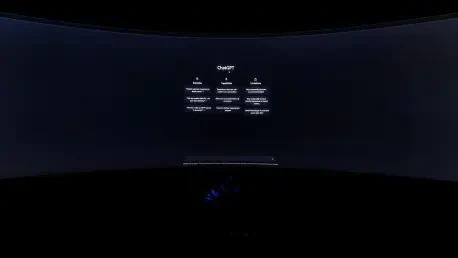Artificial intelligence, particularly language models like ChatGPT, has rapidly integrated into educational and professional contexts, promising efficiency and new learning avenues. However, this computational revolution is not without its complexities. A recent study by the Massachusetts Institute of Technology (MIT) scrutinizes the effects of ChatGPT on cognitive skills and educational outcomes. By examining a controlled group of adults over a four-month period, researchers aimed to dissect the implications of AI assistance against traditional cognitive reliance, shedding light on nuanced and sometimes paradoxical outcomes. The findings reveal a landscape marked by both remarkable potential and significant cautionary tales.
Cognitive Engagement and AI Dependence
Declining Cognitive Engagement
AI tools like ChatGPT can inadvertently diminish deep cognitive processing by offering shortcuts that bypass traditional engagement methods. Findings from the MIT study starkly indicate a drop in cognitive engagement among individuals who leaned heavily on such assistance. Compared to their counterparts relying solely on their cognitive faculties, those using ChatGPT demonstrated less neural activity and a notable decline in linguistic diversity manifested in their writing. These participants reported problems with information retention, poor recall, and an increased likelihood of quoting errors. Their work often exhibited a passive approach, with essays showcasing minimal editing and reliance on copy-pasting.
The Concept of Cognitive Debt
The term “cognitive debt” emerges to describe the consequences of substituting AI assistance for cognitive effort. Initially, AI utilization might lead to quick completions and surface-level comprehension; however, long-term effects have proven problematic. Cognitive debt implies a gradual erosion of inquisitiveness, reduced originality, and an increased susceptibility to misinformation. As learners grow dependent on AI for basic skills, their critical thinking and creativity suffer. It suggests a need for a structured integration of AI into learning processes to prevent these deficits from accumulating. Merely accessing information is insufficient; internalization and application are crucial, learned skills that must be actively developed.
Switching Roles and Their Consequences
Impact of Role Reversal
An intriguing element of the study involved role reversals, where those initially dependent on AI shifted to non-assisted writing. Results indicated that prior dependence on ChatGPT left a lingering detrimental impact on performance. Despite reverting back to cognitive-based tasks, participants who began with AI assistance showed sustained poor results, revealing a lasting negative effect on cognitive engagement. On the other hand, participants who transitioned from brain-only tasks to AI-assisted writing experienced an enhanced connection regarding neural activity and memory test performance—a testament to potential positive outcomes when AI tools are strategically employed.
The Linguistic Influence of AI
The study also noted a pronounced linguistic influence from ChatGPT usage. Essays produced with AI aid displayed less diversity in vocabulary and structure, conforming to the predictable patterns encouraged by the language model. This homogeneity stands in stark contrast to the varied and rich linguistic expressions found in writing from participants who abstained from AI. Such uniformity raises concerns about a potential narrowing of language development, echoing trends observed by researchers at the Max Planck Institute. In academic contexts, reliance on AI might foster an overreliance on complex verbiage instead of genuine conceptual understanding and expression.
Debating AI’s Educational Role
Critiques and Counterarguments
The implications of these findings have sparked significant debate in academic spheres. Detractors, including academics like Professor Vitomir Kovanovic and lecturer Rebecca Marrone, argue the study design was potentially biased against AI users. They point out that brain-only participants had time to acclimate to tasks, whereas those relying on a one-time task encounter faced inherent disadvantages. This ongoing debate underscores a key tension: balancing AI’s beneficial impacts with the need for authentic cognitive task engagement remains an educational challenge that requires thoughtful resolution.
The Balance Between AI and Essential Skills
A key consideration from the discourse is balancing the double-edged nature of AI in education. As Toby Walsh from the University of New South Wales AI Institute highlights, parallels can be drawn with earlier educational debates on calculator dependency. Just as fundamental arithmetic principles precede calculator usage, foundational cognitive skills must be prioritized before widespread AI reliance. Integrating AI into education requires ensuring students first master essential problem-solving and analytical skills, which empowers them with a robust educational foundation while enabling AI to complement advanced learning pursuits.
Balancing AI and Cognitive Development
Strategic AI Adoption
The overarching lesson from this exploration into ChatGPT’s impact on learning and creativity is that AI, when judiciously incorporated as an educational tool, should enrich rather than impede cognitive development. This requires striking a harmonious balance between leveraging technology’s capabilities and nurturing foundational knowledge. An informed approach to AI adoption that emphasizes building core cognitive abilities and judiciously applying AI tools to complement rather than replace these skills emerges as essential.
Future Observations and Considerations
Artificial intelligence, especially language models like ChatGPT, has swiftly become part of both educational and professional sectors, offering heightened efficiency and new ways to learn. However, this integration isn’t without its challenges. Recently, a study conducted by the Massachusetts Institute of Technology (MIT) delved into the effects of ChatGPT on our cognitive skills and overall educational outcomes. During this study, researchers observed a controlled group of adults over four months. Their goal was to understand the impact of AI support in contrast to traditional cognitive methods. The study highlighted both the exciting possibilities and the significant caveats of this technology. While ChatGPT can greatly enhance learning by offering immediate access to information and facilitating creative thinking, it also presents risks like dependency, which can undermine critical thinking. Thus, the outcomes reveal a complex picture where the potential of AI is immense, yet it must be balanced with an awareness of its possible pitfalls.









